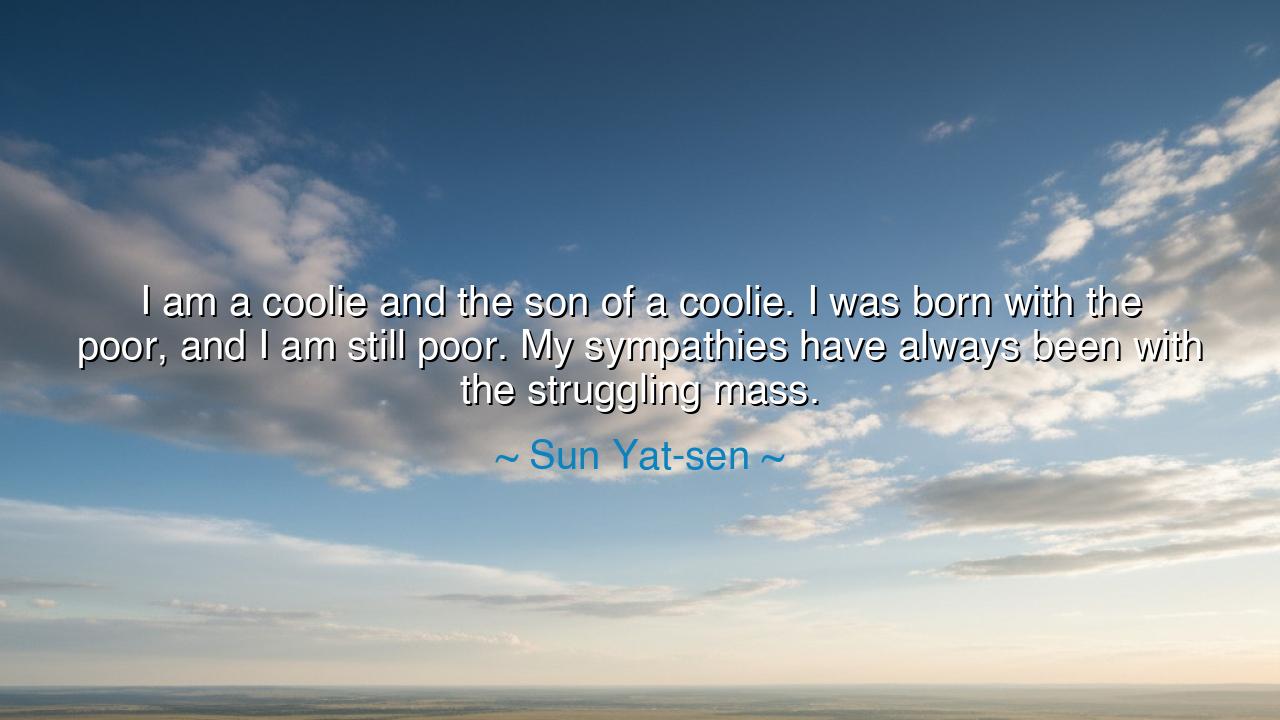
I am a coolie and the son of a coolie. I was born with the poor
I am a coolie and the son of a coolie. I was born with the poor, and I am still poor. My sympathies have always been with the struggling mass.






Hear the fiery words of Sun Yat-sen, father of modern China, who declared: “I am a coolie and the son of a coolie. I was born with the poor, and I am still poor. My sympathies have always been with the struggling mass.” In these words, he renounces the vanity of titles, crowns, and riches, and instead binds his soul to the lowly, to the laborer, to the multitude whose sweat and blood sustain the world. His confession is not weakness, but strength—an oath of solidarity that made him beloved by millions, and a reminder that true leadership flows not from palaces, but from the hearts of the people.
When Sun calls himself a coolie, he embraces the name given to the lowest of workers, those who carried loads, built railroads, and toiled under sun and lash. To the proud and powerful, such a title was shame. But Sun transforms it into honor, declaring that his destiny was never to rise above the people, but to remain with them. By this he reveals a sacred truth: that the greatness of a leader is not in separating himself from the masses, but in sharing their burdens and carrying their dreams.
The origin of these words lies in Sun’s early life. Born to a peasant family in Guangdong, he knew hardship and the weight of poverty. He studied medicine, not in pursuit of wealth, but in pursuit of service. And when he saw his people enslaved by a decaying dynasty and foreign exploitation, he turned his life toward revolution. The poor were not strangers to him—they were his kin, his neighbors, his blood. His sympathies were not borrowed for politics, but born of his own story.
History confirms the power of such identification. Consider Abraham Lincoln, who rose from a log cabin and split rails with his own hands. When he spoke of the Union and the emancipation of slaves, he was heard not as a distant ruler, but as one who had felt the roughness of labor and the sting of want. So too did Sun Yat-sen draw strength from his humble roots. His words carried fire because they carried truth, and the masses followed him because he spoke not from above, but from among them.
The deeper meaning is this: wealth and privilege can isolate the heart, but poverty teaches solidarity. To be born with the poor is to learn early the bonds of community, the necessity of struggle, the dignity of labor. Sun’s words remind us that to stand with the struggling mass is not merely politics—it is morality, it is humanity itself. For when the powerful forget the poor, their power becomes tyranny. But when the poor are lifted, nations are renewed.
Beloved listener, take this lesson into your life. Do not despise humble beginnings, nor think lowly of those who labor with their hands. If you would lead, serve first. If you would rise, rise with others, not above them. Let your sympathies be with those who struggle, for their struggle is the foundation of every society. And if you yourself are among them, do not despair—know that greatness has always been born from such soil.
Therefore, let us learn from Sun Yat-sen: cast aside pride, and bind yourself to the common people. See in their faces not weakness, but strength; not defeat, but the seeds of triumph. For the destiny of nations is written not by the few in golden halls, but by the many who labor unseen. To stand with them is to stand with the future.
Thus the words of Sun Yat-sen endure like a banner in the wind: “I am a coolie and the son of a coolie.” It is not a cry of shame, but of honor—a declaration that true nobility is found in humility, and that the heart which beats for the poor and the struggling mass beats in harmony with justice itself.






AAdministratorAdministrator
Welcome, honored guests. Please leave a comment, we will respond soon